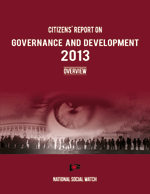Social Watch E-Newsletter - Issue 171 - June 6, 2014
Published on Fri, 2014-06-06 00:00
 |
| Issue 171 - June 6, 2014 |
|
|
|
|
| |
|
| |
It's time to stop the privatisation of the development agenda
|
| |
|
| |
 |
In 2000, the United Nations announced eight Millennium Development Goals (MDGs) to reduce poverty worldwide.
As the goals “expire” next year, new goals are being defined in UN assemblies and corridors.
Some doors in the UN will be shut to public scrutiny but wide open to corporations.
“This issue will determine the future of the UN as such,” recently commented a member of the Brazilian delegation to the UN, Guilherme Patriota.
According to Jens Martens, of the Global Policy Forum, this growing agenda-setting power of corporations is detrimental to both the multilateral system and to states themselves.
“When corporations set the agenda of governments, they undermine accountability and transparency and ultimately governments’ power,” he commented.
During the recent ITUC World Congress, Roberto Bissio of Social Watch reminded attendees how “corporations are not accountable to the people. The more power corporations have in the UN multilateral system, the more inequalities we will witness between and inside countries”. Read more
|
| |
|
| |
|
| |
|
| |
India: Citizens Report on Governance and Development
 |
Democracy is not an easy system of governance. It is fragile and its essence cannot be guaranteed only because there is an assurance of periodic elections. Its fragility is dependent on several factors among whom is the way its governing institutions function and the kind of policies that are determined by them. This requires constant vigilance lest the people who come into power and institutions that they oversee function according to the mandate given to them by the people who have elected them go astray. This vigilance can be exercised only if there is information available to the people. Thus, transparency and availability of information is critical to hold then accountability.
National Social Watch in this volume entitled “Citizens’ Report on Governance and Development 2013” has put together very useful public information about governing institutions that can help the citizens to raise issues about their functioning and help in framing much needed reforms. There is not only wealth of information but competent analysis of policies that are being framed. It is now being increasingly recognized that democracy will function better and governance more effective if government comes closer to the people. Political parties are slowly imbibing the idea that good governance is also good politics. Read more
|
| |
|
| |
|
| |
Only through financial reform can human rights be sustained. The Center of Concern provides this video for your use in classes, meetings, and other community organizing opportunities to educate viewers regarding the need for financial policy makers to be held accountable to those in marginalized situations and poverty.
The brief video stimulates new ways of thinking about equality and social justice and its inextricable linkage to financial systems. The program recommends actions that each of us can and should take to address changes in local and global financial systems to promote and sustain equality and human dignity throughout society. See the video
|
| |
|
| |
|
| |
 |
The premier international conference on public health policy is the World Health Assembly, organised by the World Health Organisation, which attracts Ministers of Health and other top health officials as well as non-governmental organisations to Geneva every year.
This is where the latest trends in public health problems are presented and debated, and action plans for solutions are adopted. This year’s Assembly, which closed on May 24, had 3,500 participants and saw a record number of issues debated and resolutions adopted.
A side-event by health NGOs focused on how the middle-income countries were being left out of schemes such as supply of free medicines or the relaxation of patent rules to help the poor, as these are often reserved for low-income countries.
Some developing countries voiced frustration on how they are being picked upon by the United States for having patent laws that prioritise making medicines affordable to the public.
Dr. Chan, in another speech, also criticised free trade agreements that enable tobacco companies to challenge measures taken by governments to curb cigarette sales. Read more
|
|
| |
|
|
|
| |
|
| Made possible thanks to the funding and support of Oxfam Novib and the Flemish North South Movement - 11.11.11. |
 |
| The contents of this publication are the sole responsibility of Social Watch and can in no way be taken to reflect the views of Oxfam Novib and the Coalition of the Flemish North South Movement - 11.11.11. |
|
|
|
SUSCRIBE TO OUR NEWSLETTER
Submit
|
